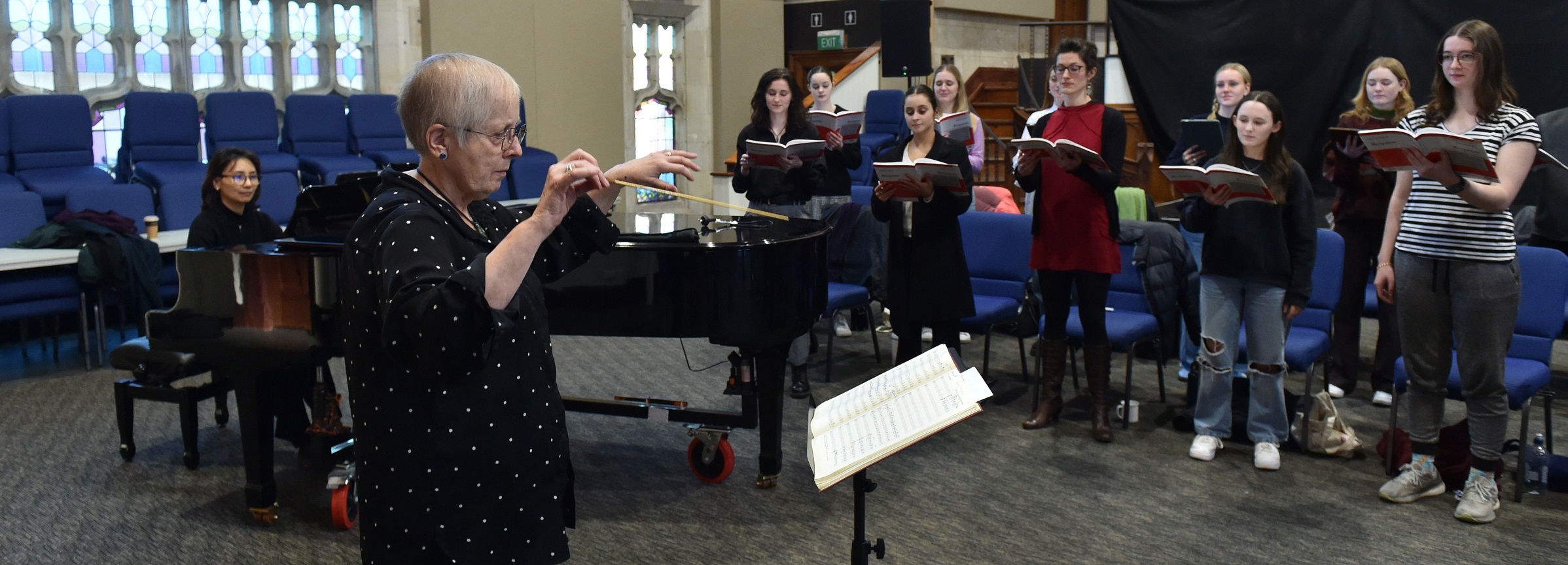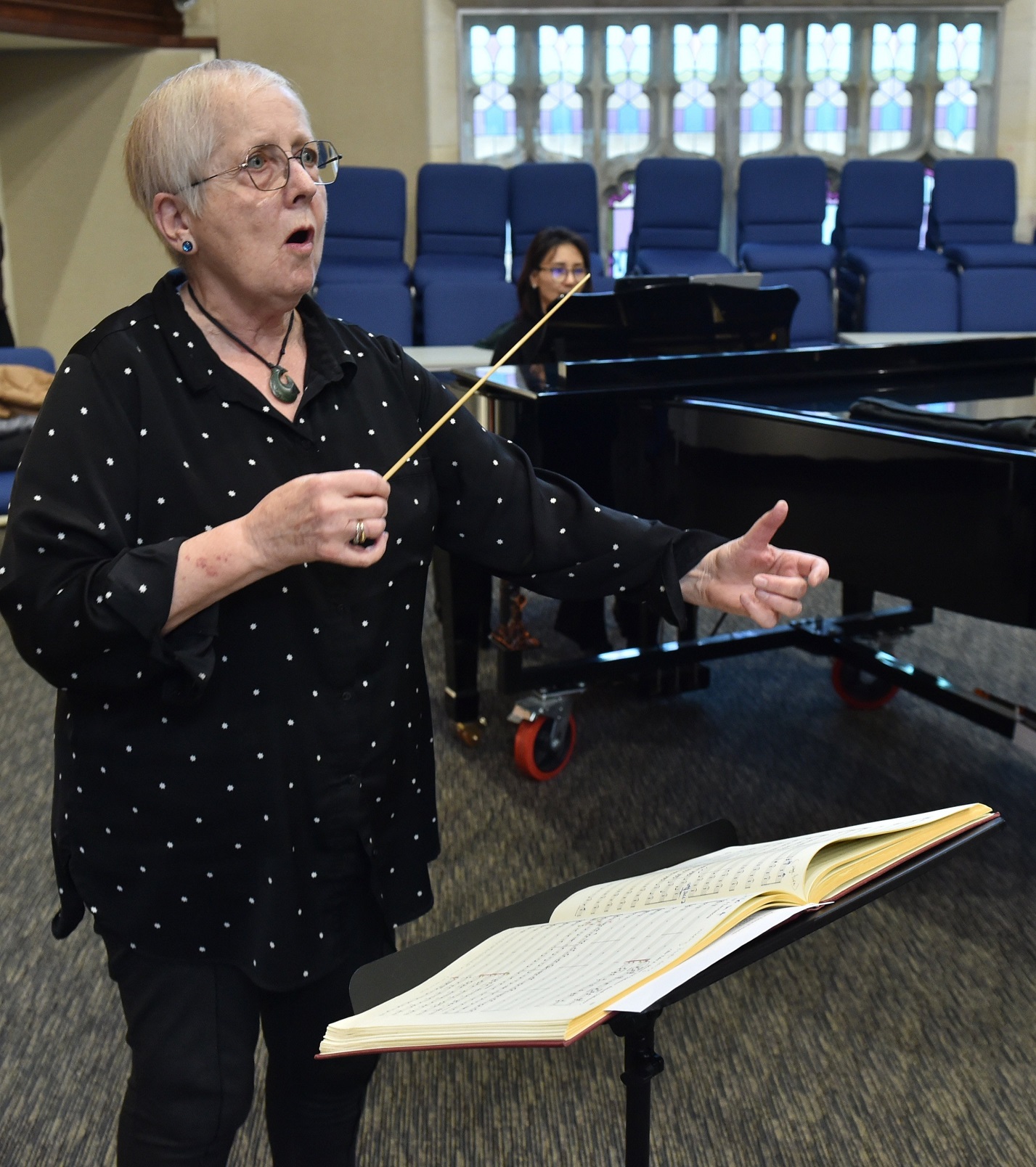
Karen Grylls has an admission to make.
"You could say I’m a bit nerdy about singing."
Ever since she had her first choral experience with the University of Otago’s choir in Marama Hall in the late 1960s, Grylls has been attracted to telling stories through song.
"I lived in small places, so there was not a lot of opportunity. I never had the chance to learn singing. There were no singing teachers when I was growing up," Grylls says of her childhood in Winton and Nightcaps.
"I’ve acquired my knowledge later, but I love words and I love the fact that singing is that thing, that thing that makes a difference for me. It’s got a real spiritual quality; it’s the thing that gives back in spades and that means a lot to me."
It was her piano teacher who suggested she give conducting a go but back then she had no idea what it meant.
"I said ‘I beg your pardon? Is that because I’m a terrible pianist?"’
But when it was suggested at university that Grylls could prepare the chorus for Faure’s Requiem, she gave it a go.
"I sort of fell into the conducting side of it and learned the singing stuff as I went along."
She had found her "home".
"It was great to find a bunch of nerds who loved it just as much as I did."
Grylls was not to know decades later she would be still conducting and directing singers with a Companion of the New Zealand Order of Merit (CNZM) for her services to choral music, among other accolades, under her belt.
"I think that’s what I’m still doing today," she says of her rehearsal with Otago and Southland national choir members at Hanover Hall for this weekend’s Mozart’s Requiem in what is hoped to be the first of an annual collaboration between the national choirs and the Dunedin Symphony Orchestra.
"These people are going to be really excited when we rehearse tonight. The business is about performing, about being together in the moment. It’s like the sevens win gold in rugby. They’ve got to all be on the field if they’re going to do that and they’ve got to all be fit and those are the elements, being fit for singing and being prepared and all those things. That’s the challenge sometimes because of course it’s not an income; it’s a hobby rather than a jobby."
For Grylls, it has become both. She trained as a teacher thinking music was not going to earn her a living — her first teaching job was at Southland Girls’ High School — and has ended up combining the two becoming an associate professor in choral conducting at the University of Auckland.
"Well working with choirs, it tends to take over one’s life, to be fair."
She founded Voices New Zealand Chamber Choir in 1989 — which won Tūi Award for Best Classical Album for Spirit of the Land in 2006 — conducted the New Zealand Youth Choir from 1989 to 2011 and is artistic director of the Choirs Aotearoa New Zealand Trust, the managing body for the NZ Youth Choir and Voices NZ. She was also artistic director of Toronto’s Exultate Chamber Choir from 2011 to 2013.
"I like to say music is greedy — it just takes you over. If you’re a muso the thought of any part of life without music at all would just be horrendous and the good thing is the skills that you learn, they’re transferable into different stages of life, so now I’m at the point in my life where I can pay things forward and so that’s what I’m doing."
Eighteen months ago she helped start up a new children’s choral academy, at present based only in Auckland, of which she is artistic co-director. The senior Academy Choir, the training ground for the youth and secondary school’s choirs, won a gold medal.
"We were absolutely thrilled. We never thought they would but that’s one of those wonderful moments. So we were pretty excited about that. It’s just a nice way to acknowledge the hard work and what we do."
Seeing choirs from around the world perform was invaluable for young New Zealand singers.
"To really hear other choirs and good choirs and share and be part of a bigger international family, I guess. Great exposure," she said.
One of her past highlights was taking the youth choir to the World Choir Games in Llanglollen, where they won Choir of the World at the International Eisteddfod in Wales in 1999 and Overall Best Choir at Cantat Grand Prix the same year.

Describing herself as tough but fair, Grylls believes preparation is of the essence.
"The better you are prepared, the better you then can engage with the singers and help bring them to a level and a standard and present something that they never thought they could and I think that’s what I’m fired up about. They don’t know that together they can do something amazing with the right teaching and the right leadership."
But for Grylls the real highlight is the impact on singers themselves and hearing years later about what the music meant to them. Many of the country’s top singers have gone through the choirs over the years.
"But I think the things that I remember more is how music actually really changes people’s lives. I think for me that’s the biggest thing, not the successes and notches on belts of what the world demands, but what really matters to me is what you passed on and what young singers take away with them and passed on to others in turn."
Despite competitions playing a big part of choral life, Grylls would be happy to do away with them, saying they are only a snapshot of a performance on the day and the next day a performer could be better or worse.
"As Dame Kiri Te Kanawa says, today’s successes are tomorrows fish and chip papers. But when see the looks on singers’ faces, that lasts forever — that is what I am privileged to be part of."
However, in saying that she took part in the World Choir Games as a juror and takes part in international juries, finding it a good way to keep up her energy and clarity.
She much prefers being involved in festivals and collaborations such as the one in Dunedin this weekend.
"I’m here to prepare them so that they will take part in something that is local and that gives me a great thrill. It’s saying what can we do to contribute to our communities with the national choir members that live in a particular region and I think that’s what we would hope the national choirs do is support projects and be part of the musical environment and the musical activities in Otago-Southland."
There is no shortage of work and the popularity of singing continues even if they need to continue to promote its benefits.
"We know that an hour of singing is going to improve your maths; it’s going to improve your English; it’s going to improve your life. And there’s scientific [research] — this is not just my fanciful idea; it’s a scientific fact."
The experience of the pandemic had helped people realise what communities choir built and what they could do for the quality of people’s lives and their wellbeing, although it had also resulted in challenges, she said.
"People have got used to sitting at home at the end of computers instead of actually getting out to rehearsal and realising you can’t just do your bit at home. This is a team; this is something that we do together and that’s really starting to come back and the World Choir Games has helped that and that’s why these projects that I’m involved in here [Dunedin] are so important."
Over the years she has found having "good ears" and a listening knowledge of how to unpack a music score and communicate it have been important.
"Those skills are constantly refined and to communicate with people. This is a people business and it’s a performance business, and you have to bring them together and give them the skills they need and then let them feel their part in achieving what they’ve done that’s really important."
On the rare occasion music is not featuring in her daily life she will be making the most of the outdoors.
"I like being outside. I like gardening. I like doing some things that give me a totally other, different experience from being inside ferreting through scores and, you know, fixing things and performing."
Even listening to music recreationally becomes an exercise for Grylls.
"I like all different sorts of music, so I’m more interested in listening to what different performers have to say about a piece I know. I wonder what that person does there?"
She made an exception for the Olympics recently, watching the "phenomenal commitment and finesse" of the horses in the equestrian events.
"That speaks to me, because that’s what I try for in my own world."
To see
Mozart’s Requiem, Dunedin Symphony Orchestra, soloists and City Choir Dunedin and Otago-Southland members of national choirs, Dunedin Town Hall, August 24, 7.30pm.












